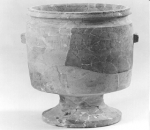 I have been thinking lately about stone jars.
I have been thinking lately about stone jars.
Stone jars figured prominently in the gospel text for the Second Sunday of Epiphany, read all around the world a few weeks ago. I was visiting friends and colleagues in India at the time: we read the text. My wife attended services in Minneapolis: she read the text, as well. You may have, too.
The text relates the familiar story of “the wedding at Cana” – the first of Jesus’ “signs” recorded in the Gospel of John (cp. 2:1-12). Together with his mother, his brothers and his disciples, Jesus participated in a wedding feast in Cana of Galilee. And when the wine ran out – well, you remember how the story goes. Mary brings the need to Jesus. Jesus commands six stone jars to be filled to the top with water. And a miracle ensues.
Stone jars, I suppose, were the most common thing in the world, in first-century Palestinian homes. The Jewish people, we read elsewhere, had developed a noticeable fondness for washing things: “For the Pharisees, and all the Jews, do not eat unless they thoroughly wash their hands” (Mark 7:3). They washed what they brought home from the market. They washed cups, pots, and kettles (v.4). They washed their hands before they ate and then when they were through. They washed feet, sometimes, too. They kept water at hand in “stone jars,” of just the sort found in John 2. It was common water, no doubt, in common jars, for these common everyday uses.
But Jesus filled the jars with a miracle.
The passage took on life for me as I traveled in northern India. When I arrived in the home of my hosts, they washed my feet. Before every meal, we washed our hands. Silverware was optional; it is the custom of many to eat with their fingers. So by the time you were through with a meal, you needed to wash your hands again. They had vessels, too, for distributing the water for this washing: the “lotta” and the “talli,” a simple brass pitcher and basin. They are the most common things in the world, in that part of India. Every home, I think, must have them.
Jesus still fills common things with a miracle, if we let him. Just the “lotta” in our hand. Just the stone jar, standing in the corner.
Are you a student? Give your studies to Jesus and see what he will make of them.
Are you a businessman? Give your business to Jesus and see what he will do.
Are you a teacher? Give your students to Jesus. He wants to make each one of them a miracle.
Are you a farmer or an administrator? Do you clean teeth or drive a truck? Or maybe you are retired, and volunteer for a living? Give to the Savior your commonplace, ordinary talents and energies. He will want to fill them with a miracle.
St. John calls them “signs.” They don’t draw attention to themselves, exactly. “Signs” point always to Jesus. Biblical “signs” are road posts: they direct people to Jesus. The “sign” at Cana “revealed [Christ’s] glory; and his disciples believed in him” (John 1:12). This is the way “signs” work throughout John’s gospel.
And this is what Jesus wants of our lives, too. He wants our ordinary, work-a-day lives to reveal something about Christ’s glory – so that the world may come to believe in him.
We do not need anything extraordinary to participate in this blessing. We don’t need jars of gold or silver or something festooned with jewels. Stone will do nicely, as it turns out. We put our ordinary lives into the service of our extraordinary Savior.
Then – oh, yes – we see what he will do….